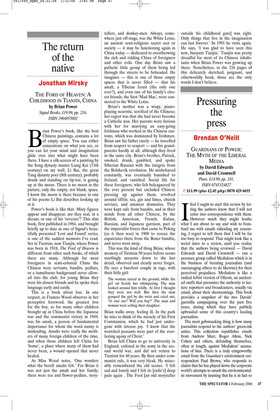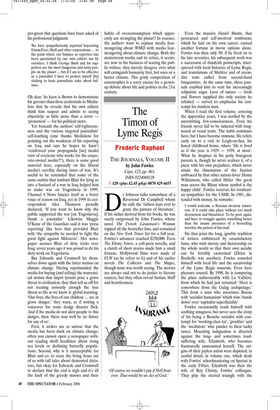Pressuring the press
Brendan O’Neill
GUARDIANS OF POWER: THE MYTH OF THE LIBERAL MEDIA by David Edwards and David Cromwell Pluto, £14.99, pp. 241, ISBN 0745324827 ✆ £11.99 (plus £2.45 p&p) 0870 429 6655 Ifeel I ought to start this review by letting the authors know that I will not enter into correspondence with them. However much they might loathe what I am about to say and wish to bombard me with emails ridiculing my reasoning, I regret to tell them that I will be far too busy to respond. That might look like a weird intro to a review, until you realise that the authors being reviewed — David Edwards and David Cromwell — run a pressure group called Medialens which is in the business of berating journalists (and encouraging others to do likewise) for their perceived prejudices. Medialens is like a radical leftist version of Ofcom, an unelected outfit that presumes the authority to lecture reporters and broadcasters, usually via email, about their shortcomings. This book provides a snapshot of the two Davids’ guerrilla campaigning over the past five years, during which they have publicly upbraided some of this country’s leading journalists.
The most gobsmacking thing is how many journalists respond to the authors’ green-ink antics. This collection republishes emails from Andrew Marr, Roger Alton, Nick Cohen and others, defending themselves, often at length, against Medialens’ accusations of bias. There is a truly cringeworthy email from the Guardian’s environment correspondent Paul Brown, who responds to claims that he has played down the corporate world’s attempts to smash the environmentalist movement by insisting that he is in fact so pro-green that questions have been asked of his professional judgment:
We have sympathetically reported boycotting Exxon/Esso, Shell and other corporations ... to the point where our balance as reporters has been questioned by our own editors not by outsiders. I think George Bush and his supporters are the most dangerous and nasty people on the planet ... but if I am to be effective as a journalist I have to protect myself [by] sticking to basic journalistic rules about balance.
Oh dear. So keen is Brown to demonstrate his greener-than-thou credentials to Medialens that he reveals that his own editors think him suspect and admits to seeing objectivity as little more than a cover — ‘protection’ — for his political views.
Yet beneath the authors’ self-righteousness and the various targeted journalists’ self-loathing (one thanks Medialens for pointing out the weakness of his reporting on Iraq and says he hopes he hasn’t ‘reinforced your propoganda [sic] model view of everyone who works for the corporate-owned media?!’), there is some good material here, especially on the liberal media’s servility during times of war. It’s useful to be reminded that some of the same outlets that lambast Blair for lying us into a bastard of a war in Iraq helped him to make war on Yugoslavia in 1999. Channel 4 News fancies itself as a brave voice of reason on Iraq, yet in 1999 its correspondent Alex Thomson proudly declared, ‘If you want to know why the public supported the war [on Yugoslavia], thank a journalist.’ Likewise Maggie O’Kane of the Guardian said it was ‘press reporting’ like hers that provided Blair with ‘the sympathy he needed to fight the good fight against Milosevic’. Her newspaper accuses Blair of dirty tricks over Iraq; seven years ago it was proud to do his dirty work on Yugoslavia.
But Edwards and Cromwell let themselves down again with the latter section on climate change. Having reprimanded the media for buying (and selling) the nonsensical notion that tinpot tyrants pose a grave threat to civilisation, they then tell us off for not treating seriously enough the true threat to life as we know it: global warming. ‘Our lives, the lives of our children ... are in grave danger,’ they warn, as if writing a voiceover for some dodgy disaster flick. And if the media do not alert people to this danger, then ‘there may well be no future for any of us’.
First, it strikes me as untrue that the media has been slack on climate change; often you cannot open a newspaper without reading shrill headlines about rising sea levels or declining butterfly populations. Second, why is it unacceptable for Blair and co. to scare the living Jesus out of us with tall tales about demented dictators, but okay for Edwards and Cromwell to declare that the end is nigh and it’s all the fault of the greedy masses and their habits of overconsumption which apparently are strangling the planet? In essence, the authors want to replace media fearmongering about WMD with media fearmongering about climate change. Both the mainstream media and its critics, it seems, are now in the business of scaring the public witless; they merely disagree over what will extinguish humanity first, hot wars or a hotter climate. This grisly competition of catastrophes is a sorry excuse for a grownup debate about life and politics in the 21st century.






























































































































 Previous page
Previous page